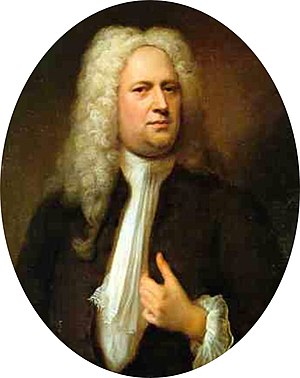 Image via WikipediaWith most schools back in session this week, I was reflecting on my high school choir memories of singing the alto part to Handel’s Messiah each and every Christmas. Practice rehearsals started the first part of September. A few months later we would be ready to perform.
Image via WikipediaWith most schools back in session this week, I was reflecting on my high school choir memories of singing the alto part to Handel’s Messiah each and every Christmas. Practice rehearsals started the first part of September. A few months later we would be ready to perform. I personally think George Frederic Handel was one of the greatest composers and organists of the Baroque period. Handel was born in Germany but traveled to Italy where he learned about Italian styles of music and later moved to England, where he lived for the rest of his life.
As it turns out, Handel did not come from a musical family. Instead, his father was a barber surgeon in a German royal court. He was over 60 when Handel was born and decided his son should study law. He died when Handel was in college, so George quit law school and became a full-time musician. First he was an organist at the cathedral in his hometown, and when he was 18, he moved to Hamburg to play the violin in an opera-house orchestra. He also started composing and producing operas.
As I mentioned earlier, Handel was interested in music from a young age, but his father wanted him to study law. Supposedly young Handel took a small clavichord up to the attic and practiced in secret when his family was a sleep. His father finally allowed him to take lessons from a local organ player. Handel learned to play keyboard instruments and the violin and also studied composing.
By the time Handel was 21, he traveled to Italy to learn more about opera. During his three-year stay in Italy, he met many composers, including Domenico Scarlatti and Arcangelo Corelli, and learned everything he could about writing operas in the Italian style.
In 1709 he went back to Germany to work in Hanover at the court of the Elector (prince) George Ludwig. Handel liked to travel and soon went on a trip to England to attend performances of some of his operas. He liked England so much that he decided to stay there. Oddly enough the prince he worked for in Hanover became George I, the next king of England. Handel was a popular composer in England where the audiences loved his music.
During his long 74-year life Handel composed many types of works. He first gained popularity as an opera composer. In London he wrote over 40 operas, all in the popular Italian style, which he learned during his trip to Italy.
After awhile, the audiences grew tired of operas, and Handel turned to writing oratorios and orchestral music, often for special occasions at England’s royal court. “Water Music” and “Music for the Royal Fireworks” became especially popular.
Music for the Royal Fireworks
The Music:
As it turns out, in 1749 Handel was asked to write music to celebrate the end of war. The music was background music while fireworks were set off. The music used an unusual number of wind instruments because King George II of England wanted the music to sound military. It had 24 oboes, 12 bassoons, 9 trumpets, 9 horns and many drums. Handel wanted to include strings instead, but the King got his way. In later performances Handel used string players instead of so many winds.
The Rehearsal:
Essentially, the rehearsal for the performance was very successful. A crowd of 12,000 people crowded the streets to hear the music and created a 3-hour traffic jam of carriages so that nobody could cross London Bridge.
The Concert:
You’d think that after the rehearsal, the performance itself would be flawless. Unfortunately the performance 6 days later did not go well because the fireworks were not impressive. Then things got worse. The musicians played in a wooden building that was put up just for the concert, and the fireworks set the building on fire. Handel quickly set up another concert that went better, and the work has been popular ever since.
All in all, you'll find lots of Handel’s work in:
Opera
Concerto Grosso
Orchestral Suites
Organ Music
Vocal Works
Oratorios
Cantatas
Church Music
When I think of Handel, almost instantly I think of the song “Sarabande” and the minor sounds it produces. But mostly I remember singing in the choir to Messiah. This incredibly rich oratorio features an elaborate mix of chorus, soloists, and orchestra. King George decided that this work was worthy of being attended. Here is one of the most interesting traditions connected to this masterpiece.
When the Hallelujah chorus began to play in the performance, the King abruptly stood up, apparently as a way of indicating he recognized that Christ was the King of Kings. Now it was normal protocol that if the King stood at any time, no one in his presence sat, and so the entire audience stood for the performance of the Hallelujah Chorus. Best of all, this tradition has been maintained even until today.




